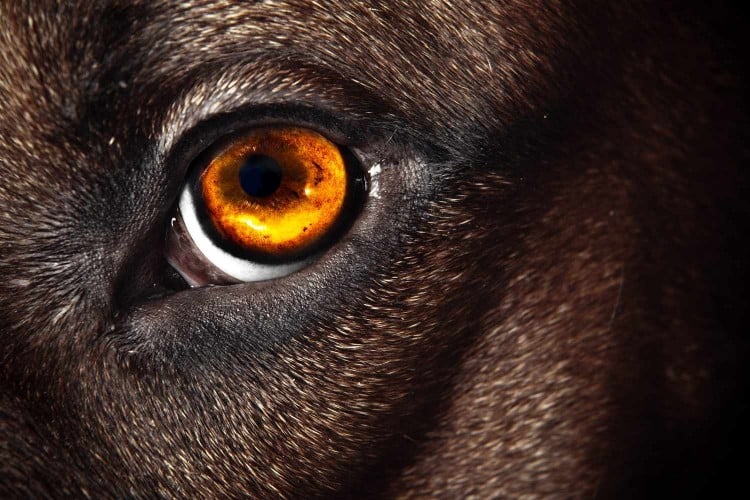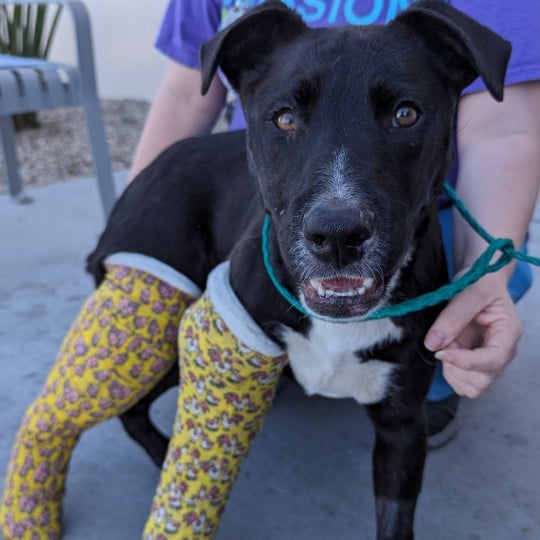
Taking your canine friend out for a late-night potty break might require you to wear night-vision goggles, but what about them? Can dogs see in the dark? Surprisingly well, actually. While they can't peer clearly into total darkness (neither can we) their low-light abilities are better than ours.
Why Can a Dog See in the Dark?
Both humans' and dogs' retinas have photoreceptors called rods and cones. Cones allow for color perception, as well as daytime visual acuity. Rods help our eyes adjust to low-light situations, helping with night vision, shades of gray, and tracking movement, explains Georgina Ushi Phillips, DVM.
"By analyzing the number of rods and cones in our dog's eyes and comparing them to our own, we get a great idea of what they see—and what they don't see," Ushi Phillips adds.
Canines have roughly 20 rods for every one cone, whereas humans have nine rods for every one cone. This means dogs' night vision is better in dim light, whereas we have sharper color vision. (However, it's a misnomer to say that dogs are color blind—they actually perceive shades of blue and yellow, but not green or red.) Dogs also have larger pupils, which capture more light.
Another feature that helps a dog's night vision is the tapetum lucidum. Think of it like a mirror in the back of their eyes that helps reflect and enhance light in dim conditions. This is the reason why dogs' eyes glow in the dark, a phenomenon known as eyeshine. Cats, cattle, deer, ferrets, and horses all have this reflective layer.
Can Cats See in the Dark? How a Cat's Night Vision Differs From Humans
How Well Can Dogs See in the Dark?
"It can be difficult to pin down an exact number, but research suggests that dogs see in light five times dimmer than we can," Ushi Phillips says. Dogs also have a wider field of sight, or peripheral vision, than humans. This helps them detect motion better. However, their depth perception isn't as good as ours, and this affects image clarity.
"Most dogs have 20/75 vision, which means that they have to be at 20 feet to see what humans can see at 75 feet," Ushi Phillips says. The tapetum lucidum is one reason for this, as it tends to scatter light through the photoreceptors rather than pinpoint it. Another factor is because of their wide view, they lack the binocular vision we have, which also lessens depth perception.
But dogs make up for any lacking eyesight by using their incredible nose (they have more than 100 million scent receptors) and hearing (they have 18 muscles in their ears to move them various ways and can deliberately filter out certain sounds) to zero-in on movement.
Can You Improve Your Dog's Vision?
To specifically see in the dark? Not really. However, in some dogs, such as beagles, scientists discovered that the tapetum lucidum degenerates over time. They're also more likely to develop develop cataracts as they age, as are Boston terriers, cocker spaniels, pugs, and shih tzus.
You can help your pup maintain quality eyesight during their lifetime by following your veterinarian's recommendations for a well-balanced diet, including specially formulated dog food and supplements that contain essential vitamins and minerals. Your vet can explain how nutrients such as zinc, lutein, beta-carotene, and omega-3s contribute to eye health.









Comments on " Can Dogs See in the Dark? Better Than Humans Can!" :